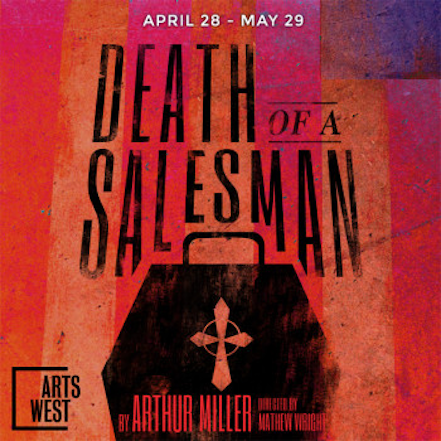Review: ArtsWest’s Death of a Salesman
Death of a Salesman plays now through May 29, 2016 at ArtsWest Theatre in West Seattle.
Fri, 05/20/2016
By Amanda Knox
Arthur Miller’s Death of a Salesman was first performed in 1949 and has since been celebrated as one of America’s greatest plays of the 20th Century. Presumably this is because of its subject matter—the debunking of the American Dream—and because of the urgency felt by the audience to witness the dissolution of this false idol depicted in a relatable way. In the play, Miller fluidly juxtaposes scenes of the promising past of an average American family, the Lomans, against their disappointing present through the eyes of the emotionally and mentally unraveling father, Willy. Their tragedy is meant to feel all too familiar, serving as an everyman example refuting American idealism: that each one of us is special, that the top of the food chain is within reach, that success is the source of happiness. The Lomans’ tragic loss of innocence finally allows for a new kind of truth to emerge—that Americans may be “a dime a dozen,” but at least we know what we truly are.
ArtsWest’s stage design and direction shines throughout this production, thanks to the talent of director Mat Wright and scenic designer Christopher Mumaw. The stage is layered with tiered floor space and fractured by walls that are more like statues of walls. The dark spaces left between them allows for some characters to pass behind them like ghosts and emphasizes how insubstantial the world the Loman family have created for themselves really is.
David Pichette was powerful as Willy Loman, a character who is an uncomfortable confrontation of despicable and pitiable. When his delusion is working in his favor, he shines, when not, he seethes. Pichette pours out energy that crackles throughout the theatre.
Eleanor Moseley as Linda Loman, Willy’s wife, was stiff at first but warmed up to her part, especially in the scene where she comes out of her shell and calls out her sons for looking down on their father even though he loves them more than he loves anything else.
The excellence of the ArtsWest production aside, Death of a Salesman is hard to relate to as a millennial. The American Dream isn’t what it used to be, even if making money and being well-liked (getting a million hits on Youtube) has carried forward. For instance, Willy’s son Biff and his central drama. Biff considers himself a bum because he can’t bring himself to follow in his father’s footsteps. Nowadays, people don’t follow in the footsteps of their fathers. If anything, that kind of behavior is looked down upon, because it flirts with nepotism. Rather, the average millennial’s dream is to somehow find a way to figure out and do what you want to do. Biff has already succeeded at realizing he’s a rancher at heart, a man of the earth, and has successfully integrated himself into that world. To the average millennial, his self-awareness is a dream come true. Who cares if his dad whines about it? If his dad really loved him, he’d be proud that Biff paved his own path. As an audience member with millennial sentiments, instead of feeling for Biff, I can only pinch my brow in bored befuddlement.
Perhaps, then, the value of Death of a Salesman is perspective. Here’s the story of how whole generations of Americans failed to make themselves happy. If we find ourselves still unhappy, what are our comparable mistakes?
Death of a Salesman plays April 28 – May 29, 2016 at ArtsWest Theatre (4711 California Ave. SW Seattle, WA 98116), Wednesdays – Saturdays at 7:30pm, Sundays at 3:00pm. Tickets are on sale now and may be purchased online at www.artswest.org or by phone at 206.938.0339, or at the box office.


